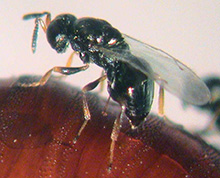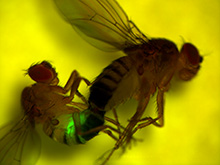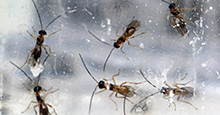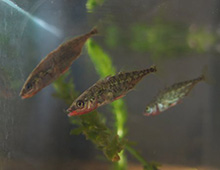Evolutionary Genetics, Development & Behaviour
The Evolutionary Genetics, Development & Behaviour (EGDB) group is a cooperative assembly of researchers within the Groningen Institute for Evolutionary Life Sciences (GELIFES). Staff members all have their own research lines but many cross-collaborations exist.
Organisms show, both within and between species, a rich diversity in morphological, physiological and behavioural phenotypes. This diversity emerges from the interplay between genetic and non-genetic factors, internally and from the environment, that determine the adaptive capacity of organisms through evolution and through developmental plasticity. Knowledge of these factors is important for understanding the implications of global change, as well as the (developmental) biology of health and disease.
To understand the proximate causes and ecological and evolutionary consequences of phenotypic diversity we integrate molecular, genomic and genetic approaches with physiological and behavioural experimentation, both in the laboratory and in the field. We study a wide array of organisms, such as insects, fish, birds, and mammals, including humans.
Focal research lines
Leo Beukeboom - Evolutionary genetics

We investigate the genetics and evolution of insect reproductive modes, life-history, and behaviour. We try to unravel mechanisms of sexual and parthenogenetic reproduction, sex determination and sex chromosome evolution, mainly in haplodiploid hymenopterans (parasitoid wasps, such as Nasonia, Asobara, Leptopilina) and diploid dipterans (such as houseflies). We also investigate life-history traits and behaviour associated with reproduction, such as photoperiodism and parasitisation behaviour, and how microorganisms affect insect performance. We do this both from a fundamental and applied perspective, to improve insects for biological control and production for food and feed. For this, we collaborate with biological control companies and the insect feed industry.
Jean-Christophe Billeter - Neurogenetics of social and sexual behaviour

We are interested in understanding the mechanisms through which genetic and environmental factors influence social behaviour. To this end we study social behaviours in the fruit fly Drosophila melanogaster, whose organization shows a strong interplay between genetics and both biotic and abiotic environmental factors. Our main lines of research evolves around the mechanisms that allow individuals to integrate social and environmental cues to make reproductive decisions, and the mechanism that explain individual differences in sociability. We seek to answer these questions at the molecular and cellular level, but are also interested in the implications that genetic variation and adaptation to environmental conditions have on the evolution of social behaviours and mating systems.
Frank Chan - Quantitative genetics and genomics
Elzemiek Geuverink - Evolutionary functional genetics and genomics

The lab is focused on the genetic basis behind variation in development and utilizes functional genetic studies, in combination with new sequencing technologies, to examine the molecular mechanisms of bacterial interference on sex determination. Many parasites manipulate the behaviour, physiology or even reproduction of their host. A particularly intriguing group of parasites are endosymbiotic bacteria that live inside body cells of insects. They are maternally inherited and have evolved different ways to manipulate their hosts into producing more females, including shifting the host from sexual to asexual reproduction.
Ton Groothuis - Behavioural biology
Felicity Jones - Molecular basis of adaptation

We study how the genome functions in in naturally evolving organisms:
- How does heritable genetic variation (e.g. mutations) affect cell fate and specialisation, organ function, and whole organism phenotypes, fitness, disease susceptibility and survival?
- Which type of mutations and molecular mechanisms enable organisms to cope with environmental change, adapt to new environments and evolve into new species?
We investigate these questions using threespine stickleback fish: a powerful model organism that bridges the gap between studying genetics and developmental biology in the lab and the natural populations in the wild.
Bregje Wertheim - Evolutionary biology of ecological interactions

Our common aim is to reveal how the genome functions in generating complex organisms that can interact with their environment, how the genome evolves, and how it can enable both adaptation and flexibility when the world changes. In addition to our fundamental research, we strive for societal impact through applied research, including effective pest management strategies against the invasive Drosophila suzukii, and the development of insects as sustainable feed.
| Last modified: | 16 April 2025 2.35 p.m. |
